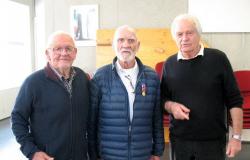Sophie Marceau will also be appearing in the play “La Note”, on March 18 and 19, in Pau, with François Berléand.
DR/Bernard Richebé
These delicate texts, which often respond to each other, sometimes evoking autobiographical anecdotes, also captivated the Pau jury of the Marguerite de Navarre literary prize, for its first edition. The actress thus dubbed by the world of letters confides in this “new” rope to her art (she had already written a first novel, Menteuse, in 1996).
Is it easier for an actress to infuse emotion into her texts as a writer?
I think that writers also know how to put emotion into their texts. Maybe we, the actors, are more aware of our feelings and we manage to convey them in our words, but it's not the same exercise. Often our texts are written, the words we speak are not ours. We actually have this psychological flexibility, this empathy which allows us to play with emotions. But transmitting them through written words is something very difficult. So much the better if I succeeded and my message got through.
What place does literature occupy in your life?
Literature came very late in my life. There were no books in the house when I was a child. And if there weren't any images, I wasn't interested. And then one fine day, I realized how essential it was. Literature has a calming effect on me. There are stories that move you, books that are luminous with intelligence. When we read, we find the deeper meaning of things. I feel much more interesting when I read a book. Thought is free there.
Your second book is published by a renowned poetry publisher. How did you approach this other literary exercise?
Poetry softens the brain. But it's also organic, it corresponds to who we are, because everything moves in life. And poetry makes things dance. It is absolute freedom and at the same time it is very rigorous.
We felt from the reception given to The Underground that you were as legitimate when you write as when you play.
It was strange because I don't feel legitimate, even in relation to cinema, which happened to me a bit like that in my life. With literature, I had a bit of the same feeling. I didn't want to be edited for the wrong reasons. I never wanted, for example, to write an autobiography, even though I can use anecdotes from my life in what I write. I like to write and I need to write. I kept this book hidden for a very long time. And then I said to myself: it doesn't make sense if no one reads it.
During the presentation of your book in La Grande Bibliothèque, the two other guests, the thriller author Jean-Christophe Grangé, and Régis Jauffret, who had just published Flaubert's Dictionary of Lovers, talked a lot about your book.
I was already amazed to be published by Seghers, who immediately understood what I wanted to express. The big bookstore was my very first promotion, and I was also surprised by the welcome. There was Jean-Christophe Grangé and Régis Jauffret. They talked about my book almost more than I did. I felt honored by these great writers who agreed to include me in their circle. Somehow, yes, they legitimized me.
How did you perceive the award of the (new) Marguerite de Navarre literary prize? Especially since Marguerite de Navarre was certainly queen, but she was also a poet.
I'm not a queen (laughs). It's magnificent, what could be better? It's great. This Marguerite de Navarre prize is a new literary prize. At first, I thought they were looking for a way to get people talking about them. And then I noticed that for the people who created this prize, literature is a profession and a passion. And that comforted me. I would even say that it encouraged me. And I am even more sorry that I cannot come and collect this prize due to a long-planned trip. I'm going to make a video message to them. It's the least I can do.






